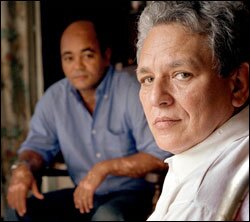Roberto Miranda, the leader of an independent teachers’ group in Cuba, has been sentenced by a Cuban court to 20 years in prison, following a dramatic roundup of political dissidents.

|
Roberto Miranda, right, was recently arrested in Havana, Cuba, as part of the government’s roundup of political dissidents. Lazaro Constantine Duran, behind, has been jailed before and is a member of a group headed by Miranda. |
His wife, in a telephone interview last week, said the sentence was handed down even after Mr. Miranda, who is 56 years old and has a history of heart ailments, had to be taken from the site of the hearings in Havana by ambulance to a hospital because of high blood pressure.
“There were no witnesses presented against him,” said his wife, Soledad Rivas Verdecia de Miranda, who was permitted to attend the April 3 hearing. “He met with his attorney one hour before the hearing.”
She added that her husband remained hospitalized, and that several efforts on her part to see him had been refused. She is asking the Red Cross to intervene and check on his health.
The 78 dissidents, who went to trial between April 3 and 7, have received sentences ranging from six to 28 years as part of a severe crackdown on political dissidents, journalists, and others openly opposed to the regime of President Fidel Castro.
As the president of the Association of Independent Teachers, Mr. Miranda has led a group of about 300 educators—most of whom have lost their jobs for their anti-government views—that seeks to end the government’s monopoly on schooling and to allow a more open voice for teachers. (“Revolutionary Education,” March 5, 2003.)
Mr. Miranda’s 20-year sentence was matched by that of José Gabriel Ramon Castillo from the city of Santiago de Cuba. Mr. Castillo, a teacher, had started a chapter of the independent teachers’ association in his city and was the founder of a pro-democracy institution there, explained Roberto Larramendi, the vice president of the national association, in a telephone interview.
Officials of the Cuban government allege that the detainees have taken money from U.S. diplomats as part of joint efforts to conspire against the island’s Communist government.
Several of those arrested and sentenced, including Mr. Miranda, have been charged with crimes against the state. More specifically, Cuban officials are singling out dissidents—particularly independent journalists—who have met with the United States’ top diplomat in Cuba, James Cason.
Friends of Mr. Miranda, however, say he has never met with Mr. Cason or maintained relations with U.S. diplomats.
“The only thing my Roberto Miranda has done is educate children and help them to learn,” said his wife. “Parents came to him for help when their children were having trouble in school.”
AFT Response

Observers say there is little doubt that the sweeping crackdown and harsh penalties will have a chilling effect on dissident activity in Cuba.
Many of those in detention have been active in promoting the Varela Project, a reform movement in Cuba that calls for a citizens’ initiative on democratic change.
During Mr. Miranda’s hearing, according to his wife, the prosecution charged that he had taught classes that were anti-government, and that he had received money from the United States to finance his activism. He was also one of several labor organizers sentenced.
“He was arrested because he organized a real labor movement in Cuba,” said Orlando Gutierrez, the national secretary for the Miami-based Cuban Democratic Directorate, which works with Cuban-based opponents of the Castro government. “He’s a peaceful democratic leader, and that’s the kind of leader that the regime wants to suppress.”
Though the international media have been distracted by coverage of the war in Iraq, increasing news of the arrests has generated a steady and increased flow of international criticism.
In response, Felipe Pérez Roque, Cuba’s minister of foreign relations, gave a three-hour press conference April 9 defending the government’s actions. He contended that they were needed to deter U.S.-led efforts to influence internal politics and sway world opinion against Cuba.
In a strongly worded, written rebuttal the following day, U.S. Secretary of State Colin L. Powell declared: “We call on Castro to end this despicable repression and free these prisoners of conscience.” He added that his office was working with the U.N. Human Rights Commission, in Geneva, on a condemnation of the actions in Cuba.
Meanwhile, the American Federation of Teachers, which has in the past supported fledgling organizing movements in Communist countries, is pressing the cause of Mr. Miranda and other labor leaders caught up in the crackdown.
“AFT members pledge to stand in solidarity with all Cuban workers who choose to organize independent unions, and we will urge the international labor community to do the same,” wrote the union’s president, Sandra Feldman, in a letter to President Castro.
David Dorn, the union’s director of international affairs, was less than optimistic about the influence that his group or any other outside organization will have on the fate of those who were sentenced.
“We are certainly going to do what we can, but in a closed society like this, it’s hard to do much,” he said. “We will, to the extent that we can, help with moral and material support for people who want to organize free teachers’ organizations.”




